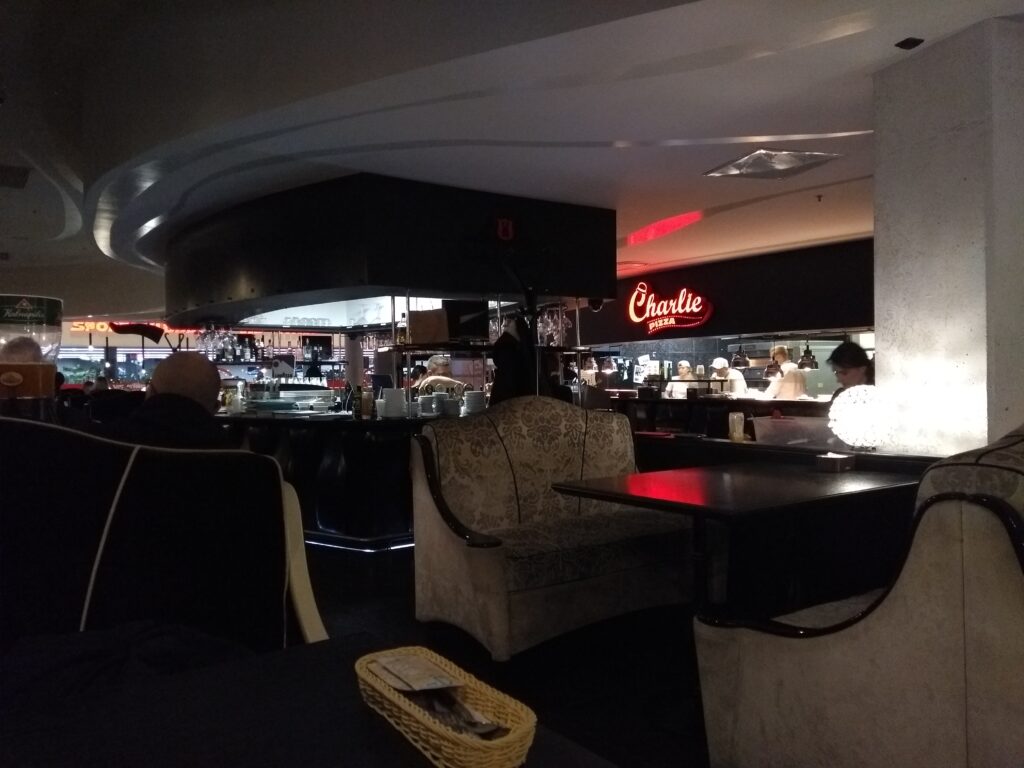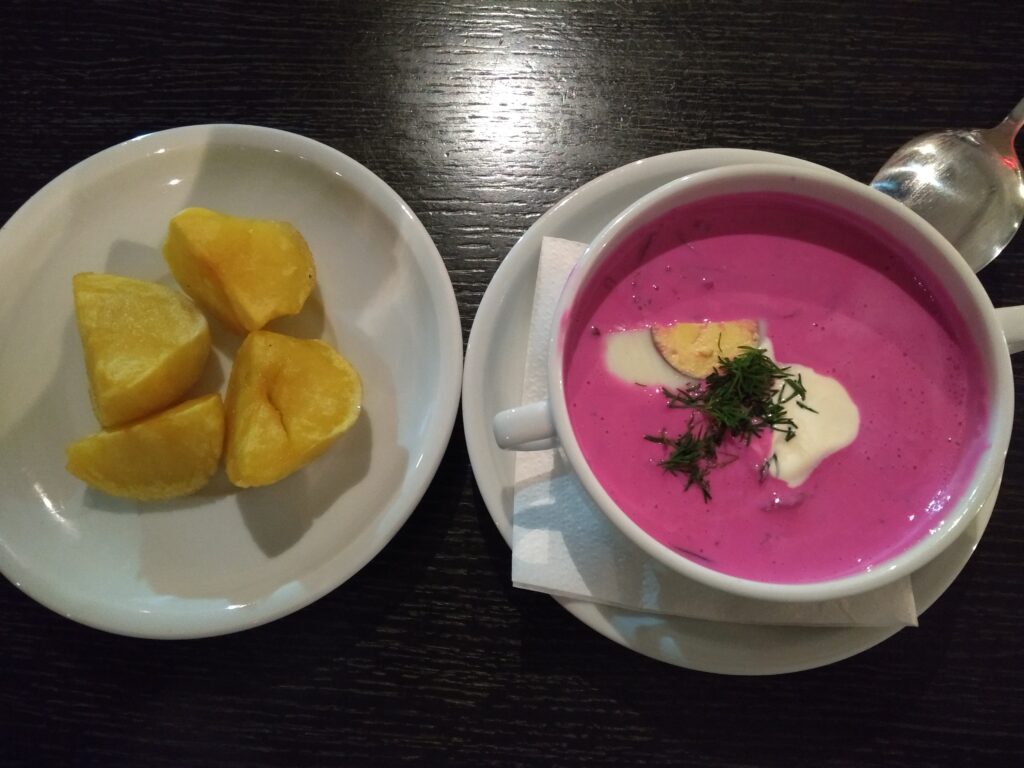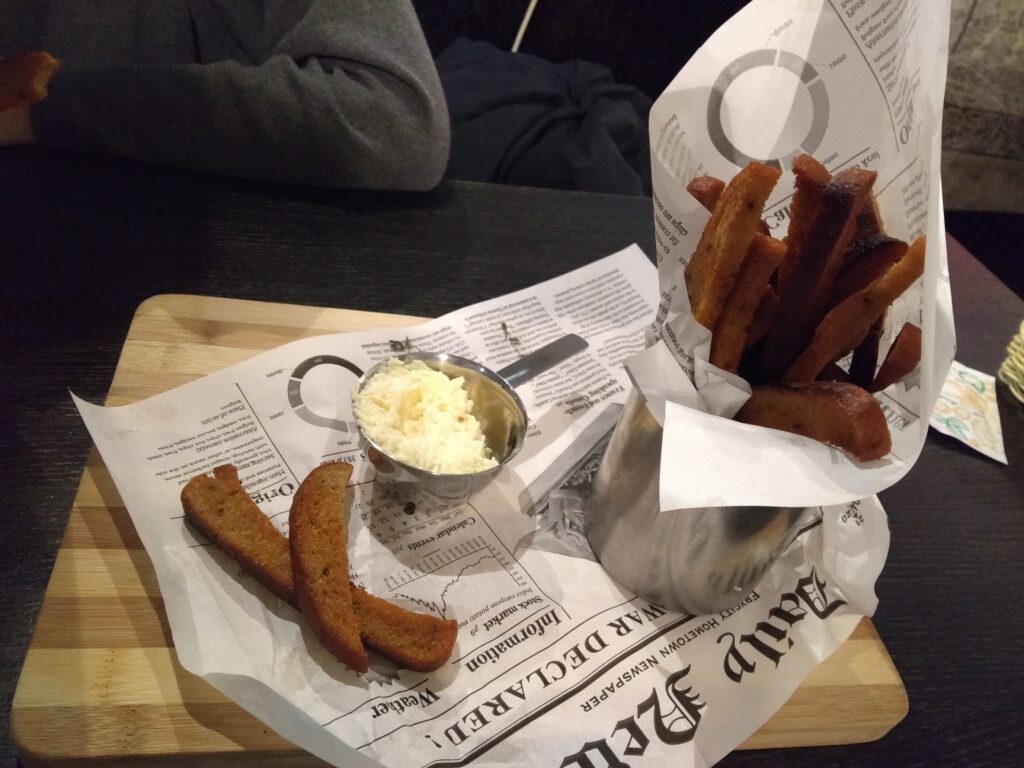#16 Herbsttagundnachtgleiche, Basektball und Rote-Beete-Suppe / Autumn Equinox, Basektball and Beetroot Soup
Am Mittwoch war Herbsttagundnachtgleiche – und die wurde hier gefeiert. Um 20 Uhr überquerten wir die Neris, an deren Ufer bereits Kerzen brannten.
/
Wednesday was the autumn equinox – and it was celebrated here. At 8 pm, we crossed the Neris, with candles already burning on its banks.
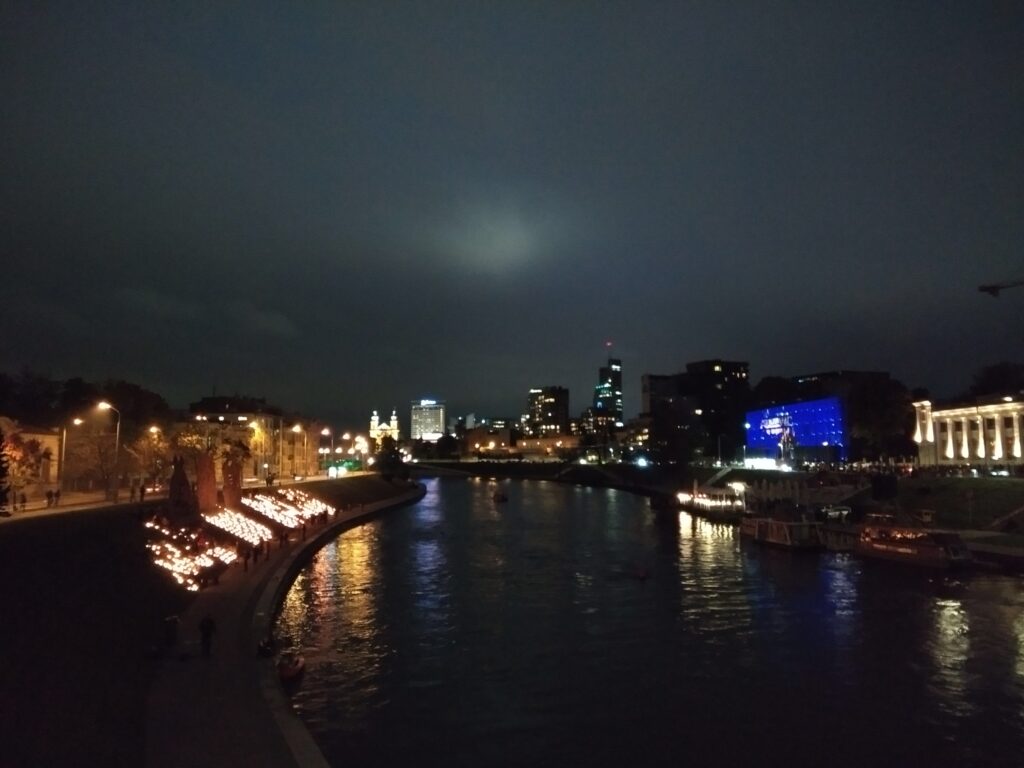
Wir positionierten uns auf der gegenüberliegenden Seite. Ich trug Anorak, Handschuhe und Mütze – es fühlte sich eher nach Winterbeginn als nach Herbstanfang an. „Von der warmen Jahreszeit Abschied nehmend und der dunklen Zeit des Jahres begegnend“, hatte in der Beschreibung des Events gestanden. Schon jetzt sollte den Gottheiten traditionell für die reife Ernte gedankt werden und damit „die Bedeutung der Grenzen zwischen den verschiedenen klimatischen Bedingungen betont“.
/
We positioned ourselves on the opposite side. I was wearing an anorak, gloves and hat – it felt more like the beginning of winter than the beginning of autumn. „Saying goodbye to the warm season and meeting the dark period of the year“, the description of the event had said. Even now, traditionally, the deities were to be thanked for the ripe harvest, thus „emphasising the importance of the boundaries between different climatic conditions“.
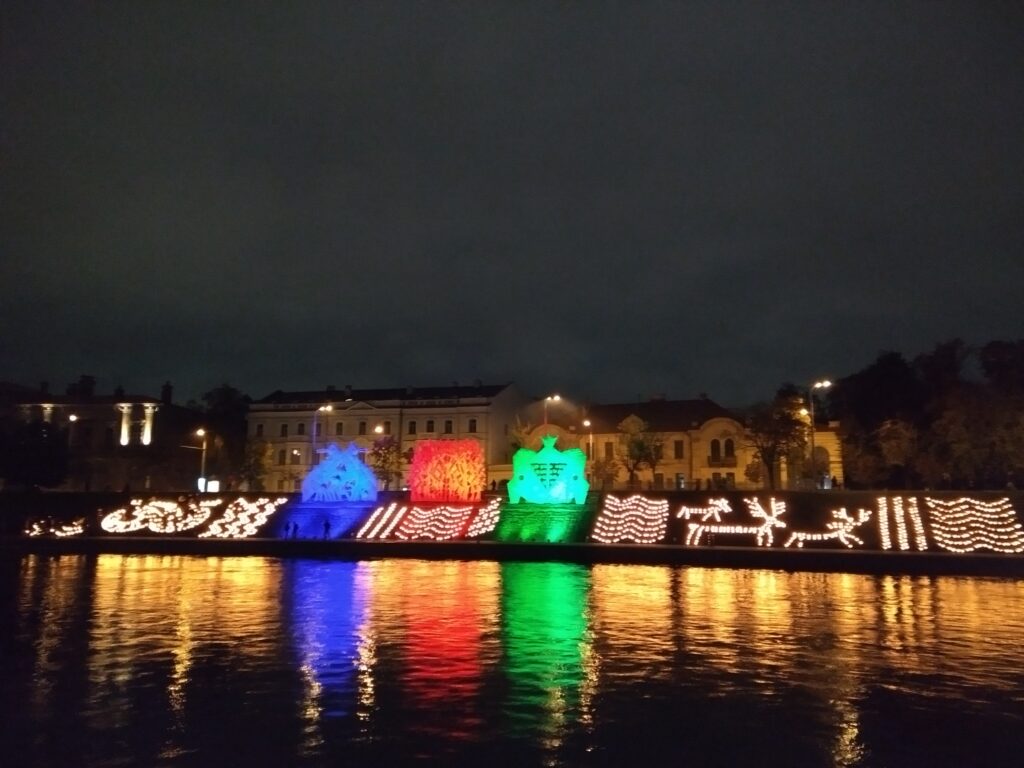
Der Hang, auf dem wir standen, war rutschig. Über dem Fluss kreiste eine Drohne, die die „Feuerrituale, begleitet von Klängen und Visualisierungen“, aufzeichnete. Die Klänge kamen von einer kleinen Bühne abseits der Kerzen und erschienen mir durch und durch litauisch. Sie waren so laut, dass eine Unterhaltung schwerfiel.
/
The slope we were standing on was slippery. A drone circled above the river, recording the „rites of fire, accompanied by the synthesis of sounds and visualizations“. The sounds came from a small stage away from the candles and seemed thoroughly Lithuanian to me. They were so loud that conversation was difficult.
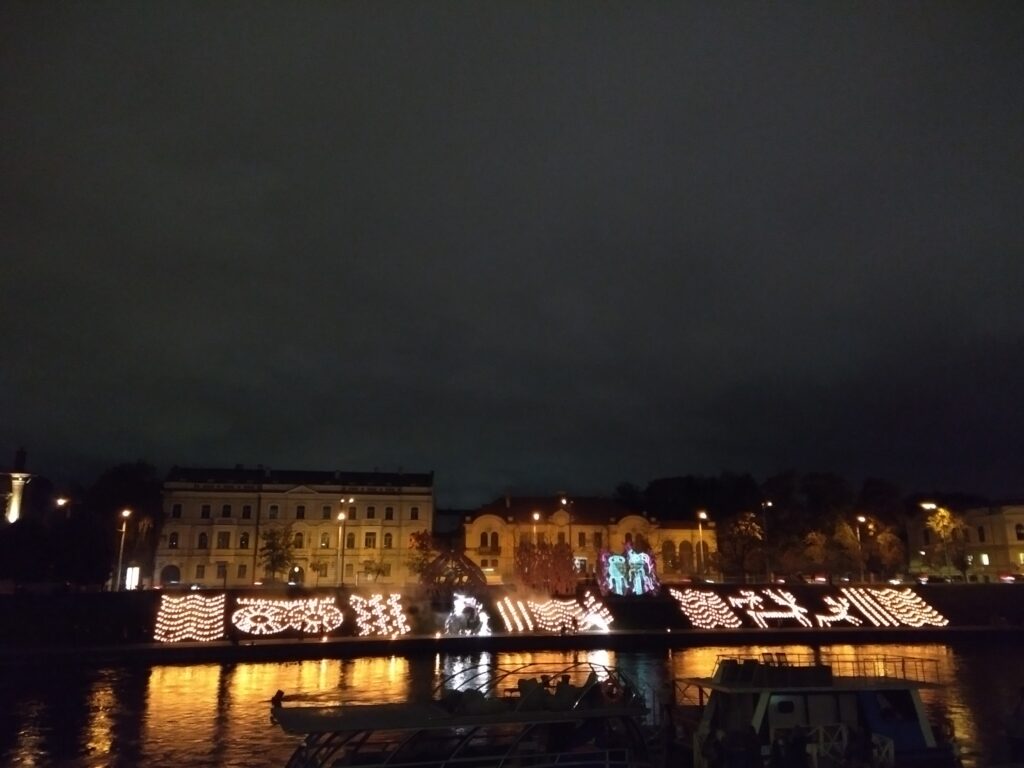
Zu verschiedenen Songs liefen Menschen mit Fackeln vor den Kerzen her und ließen Funken sprühen. Die Ansprachen zwischendurch verstand ich nicht, aber ein Wort, das wie „Corona“ klang, wurde häufig wiederholt. Schließlich wurden nacheinander die drei Strohgebilde in der Mitte entzündet.
/
To different songs, people with torches walked in front of the candles and let sparks fly. I didn’t understand the speeches in between, but a word that sounded like „corona“ was repeated frequently. Finally, one after the other, the three straw formations in the middle were lit.
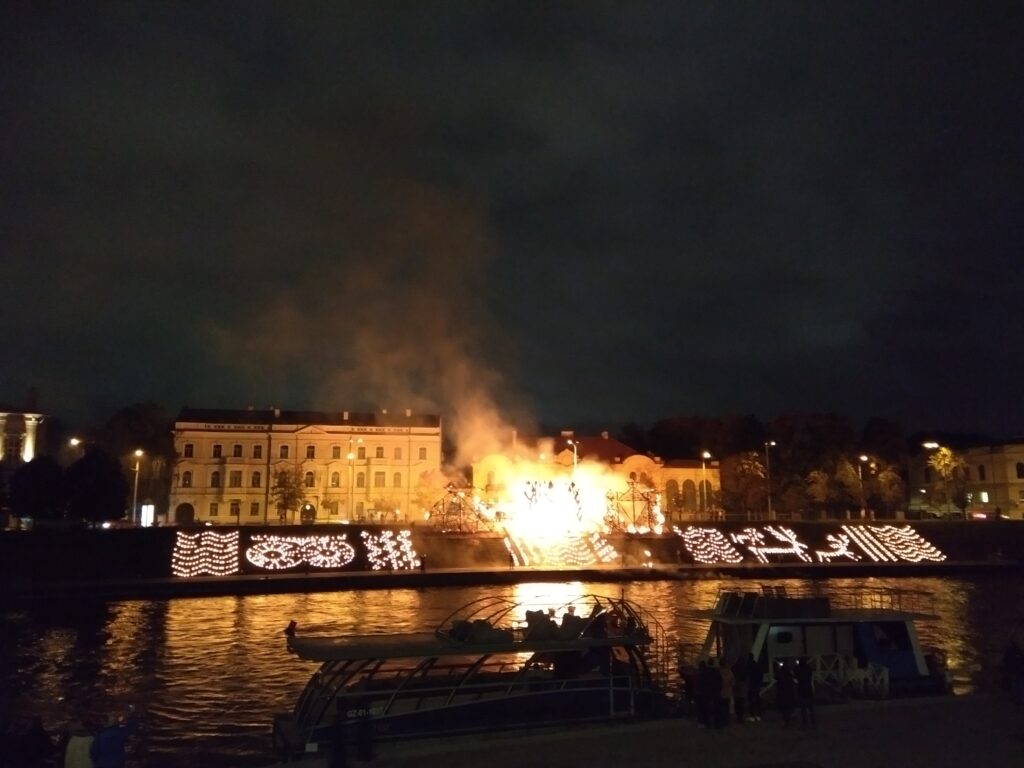
Nicht weniger laut und interessant anzusehen war das gestrige Basketballspiel. Basketball ist der Nationalsport Litauens (wie in Deutschland Fußball). Ich erinnere mich noch an meinen Schüleraustausch, als in der Gastfamilie ständig der Fernseher lief – immerzu Basketball. Die Vilniaus Rytas (in Rot) spielten gegen Šiauliai (in Gelb), eine Stadt im Norden Litauens. Ich trug einen übergroßen Pullover (zum Glück keinen gelben) und saß neben einem echten Basketballfan aus Deutschland.
/
Yesterday’s basketball game was no less loud and interesting to watch. Basketball is Lithuania’s national sport (like football in Germany). I still remember my student exchange when the TV was on all the time in the host family – basketball all the time. The Vilniaus Rytas (in red) were playing against Šiauliai (in yellow), a city in the north of Lithuania. I wore an oversized jumper (luckily not a yellow one) and sat next to a real basketball fan from Germany.
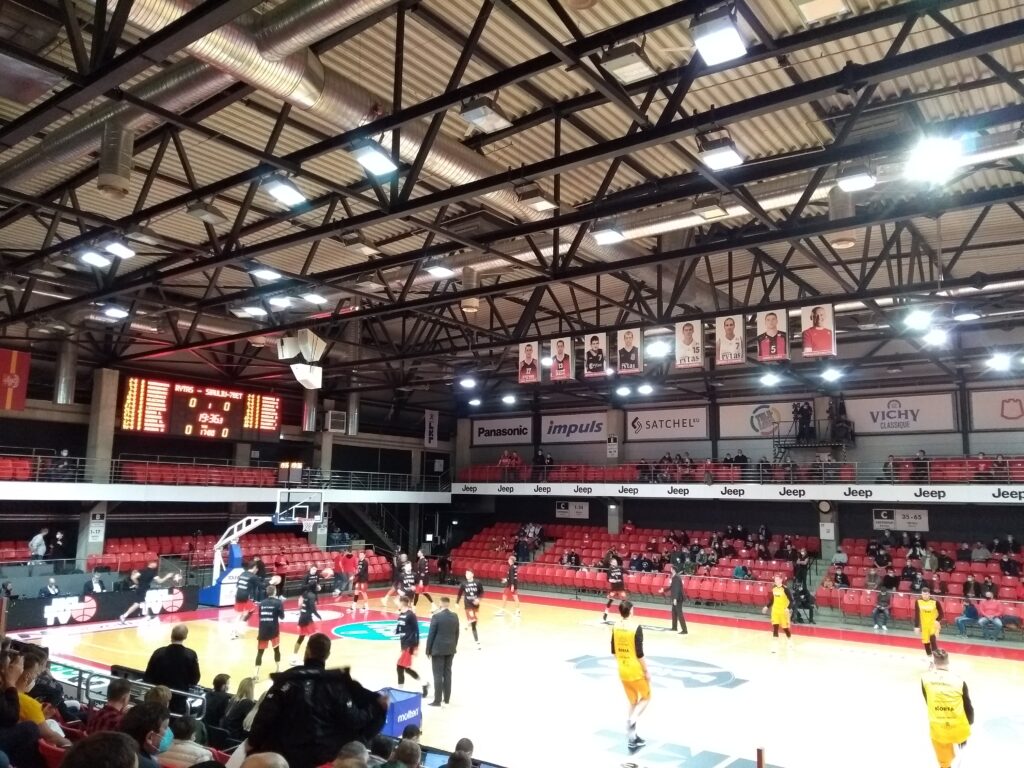
Hinter uns ertönten Trommeln. Der Fanblock der Rytas erstreckte sich direkt hinter uns. Ein riesiges Banner wurde hochgehalten, das nicht ganz ins Bild passte.
/
Drums sounded behind us. The Rytas‘ fan block stretched out directly behind us. A huge banner was raised that didn’t quite fit into the picture.

Ein Maskottchen im Wolfskostüm tanzte durch die Tribünen und über das Spielfeld. Ich fragte mich,
1. wie es Maskottchen geworden war – ob es dafür vortanzen musste.
2. wie extravertiert es sein musste, um Maskottchen zu werden.
3. wie sehr es die Rytas lieben musste, um die Hitze im Kostüm auszuhalten.
Es klappte das Maul zusätzlich zu den anderen Bewegungen auf und zu.
/
A mascot in a wolf costume danced through the stands and across the pitch. I wondered,
1. how it had become a mascot – whether it had to audition for it.
2. how extraverted it had to be to become a mascot.
3. how much it had to love the rytas to stand the heat in the costume.
It would open and close its mouth in addition to the other movements.
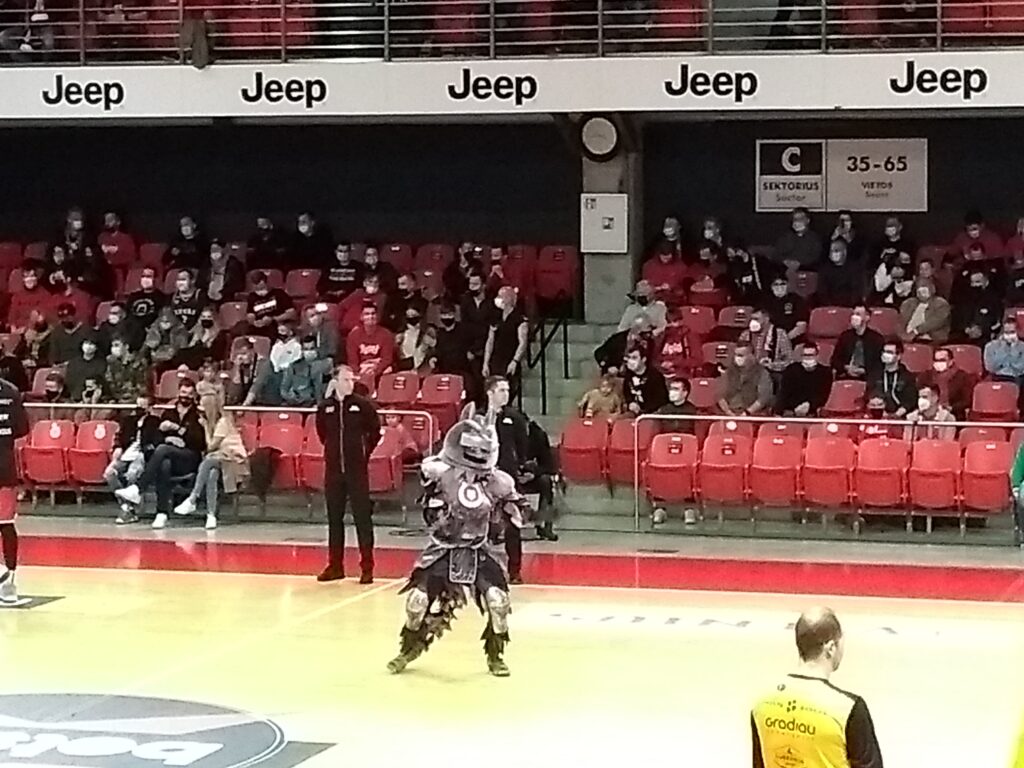
Das Maskottchen tanzte sogar hinter den Cheerleadern mit:
/
The mascot even danced along behind the cheerleaders:

Nur die Spieler der Rytas liefen ein und wurden vorgestellt (es waren mehr als die Spieler Šiauliais), aber beide Mannschaften sangen die Nationalhymne. Theoretisch – vom Gesang hörte ich nicht viel.
/
Only the Rytas players ran in and were introduced (there were more than Šiauliais players), but both teams sang the national anthem. Theoretically – I didn’t hear much of the singing.
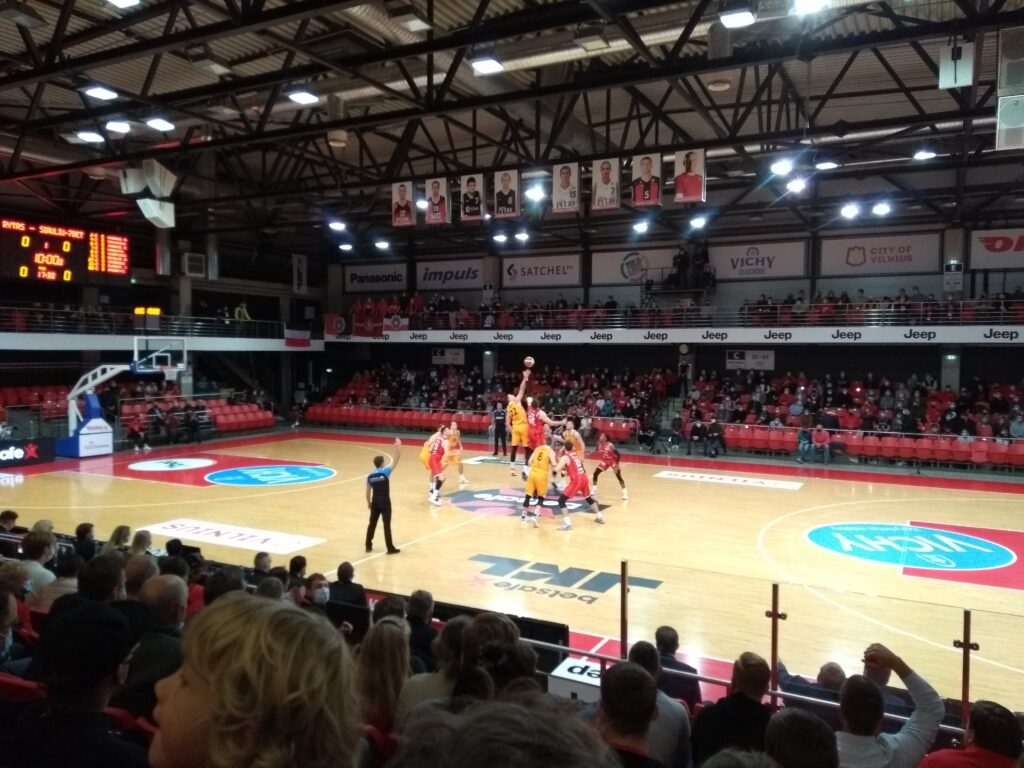
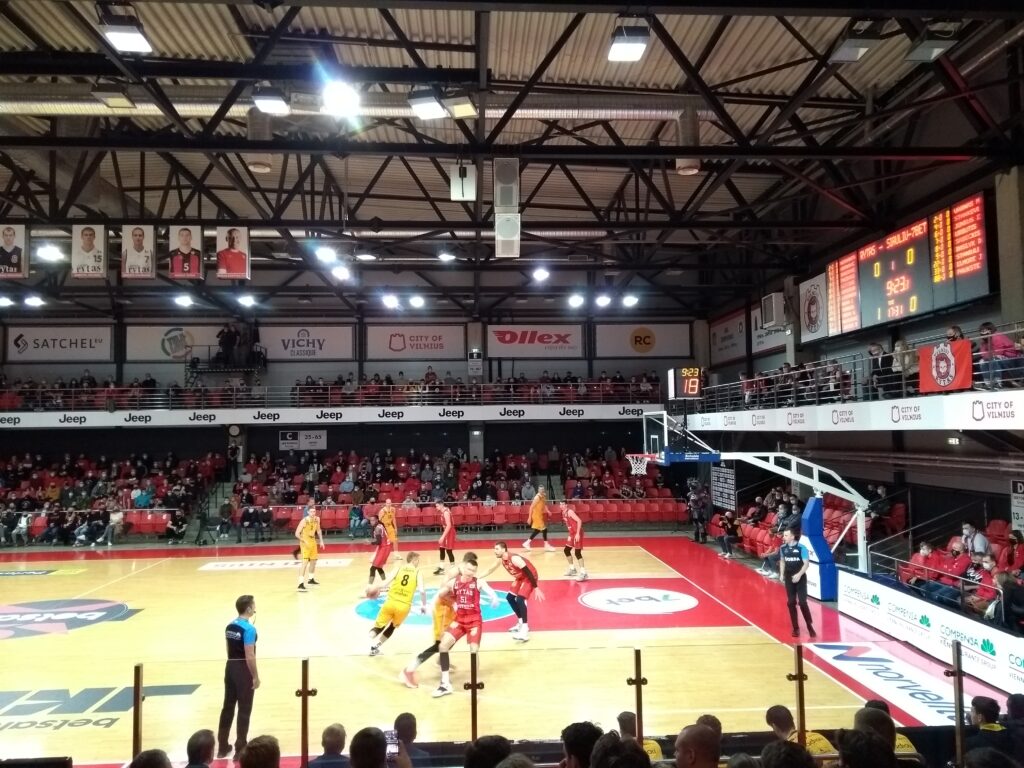
Der erste Korb ging an Šiauliai. Ich musste mich erst wieder umgewöhnen, „Korb werfen“ anstatt „Tor schießen“ zu sagen. Das deutsche Fußballvokabular ist so in mir drin, obwohl ich nie Fußball, aber drei Jahre Basketball gespielt habe. Der Basketballfan neben mir lud mich ein, demnächst mal ein paar Körbe mit ihm zu werfen – der Unisport macht es möglich: Montags und mittwochs ist eine Halle für Basketball reserviert, wobei wohl kaum jemand hingeht.
/
The first basket went to Šiauliai. I first had to get used to saying „throwing a basket“ instead of „scoring a goal“. The German football vocabulary is so ingrained in me, even though I never played football but played basketball for three years. The basketball fan next to me invited me to shoot some baskets with him soon – university sports make it possible: on Mondays and Wednesdays, a hall is reserved for basketball, although hardly anyone goes.
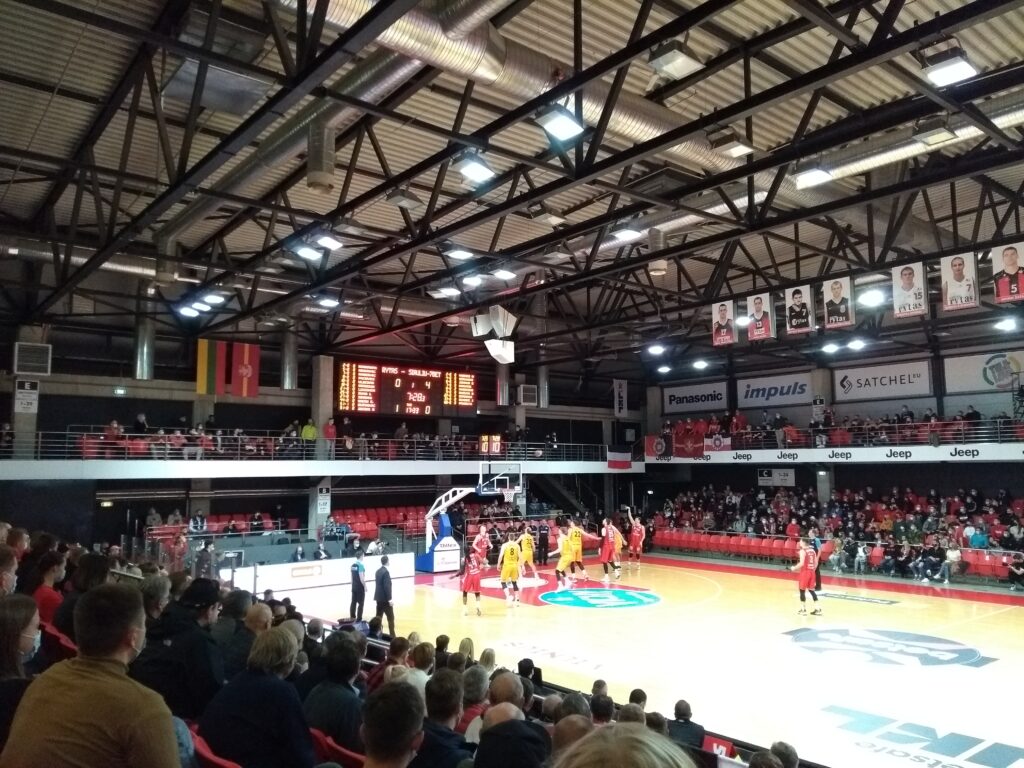
„Rytas, Rytas!“
Ich höre die Rufe immer noch. Hinterher haben sich meine Ohren taub angefühlt. „Rytas“ heißt „Morgen“ und ich glaube, nichts anderes. Wenn jemand eine Idee hat, warum sich eine Basketballmanschaft „Morgen“ nennen sollte, freue ich mich, sie zu erfahren.
/
„Rytas, Rytas!“
I can still hear the shouts. Afterwards my ears felt numb. „Rytas“ means „morning“ and I don’t think anything else. If anyone has an idea why a basketball team should call itself „morning“, I will be happy to hear it.

In den einmütigen Auszeiten kamen die Cheerleader aufs Feld, immer anders gekleidet und zu einem anderen Lied. Und die Trainer nahmen sich viele einminütige Auszeiten. Die Cheerleader hatten wohl um die dreißig Tänze einstudieren müssen. Eine Halbzeit im Basketball dauert niemals die heruntergezählten 30 Minuten. Bei jeder Auszeit, jedem Foul und Freiwurf wird die Zeit gestoppt.
Zu Beginn war das Spiel ein Kopf-an-Kopf-Rennen, dann gingen die Rytas in Führung.
/
During the one-minute time-outs, the cheerleaders came onto the field, always dressed differently and to a different song. And the coaches took many one-minute time-outs. The cheerleaders must have had to rehearse around thirty dances. A half in basketball never lasts the 30 minutes counted down. Time is stopped at every time-out, foul and free throw.
At the beginning the game was a neck-and-neck race, then the Rytas took the lead.
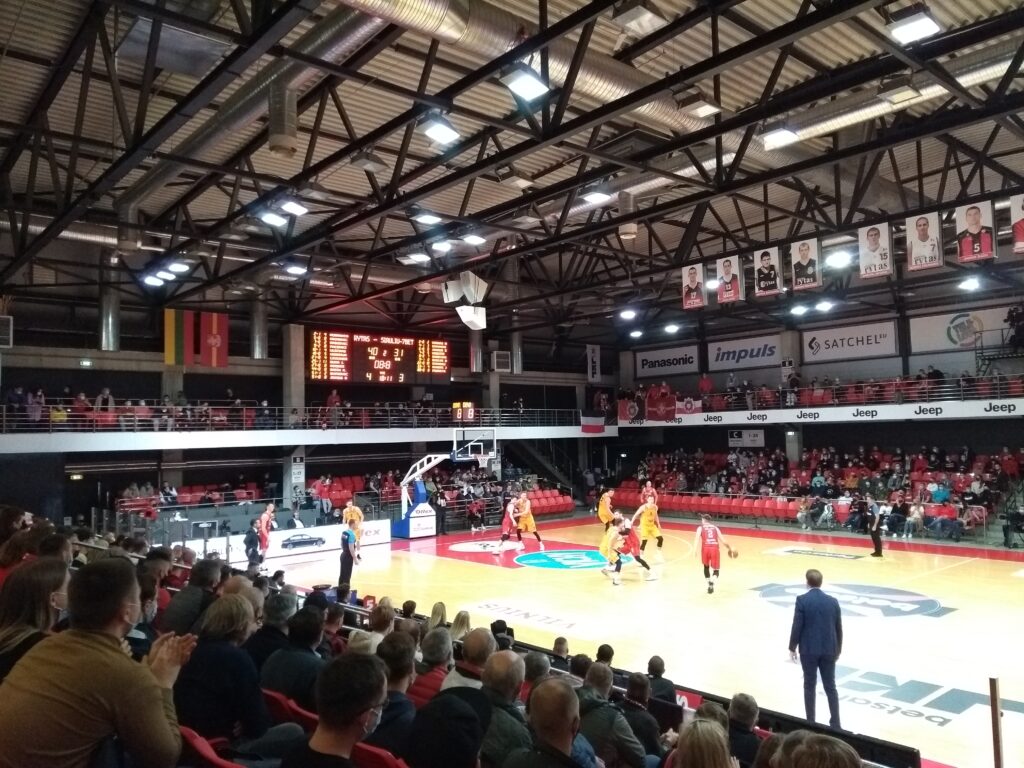
In der zweiten Halbzeit schien den Rytas die Führung sicher. In einer psychologischen Studie würde ich den Effekt von Anfeuerungs- und Buhrufen auf die Spielleistung gerne untersuchen. Vermutlich ist er mindestens morderat. Ich würde es auch begrüßen, wenn das nächste Spiel in einer neutralen Umgebung stattfände, mit gleich vielen Fans auf jeder Seite. Wo saßen die Fans Šiauliais?
Nachdem ein Spieler Šiauliais so heftig gefoult hatte (nicht gefoult worden war), dass er das Feld humpelnd verlassen musste, bekam Šiauliai neuen Antrieb und holte auf. Basketball ist ein Spiel der Runs. Am Ende war es sehr knapp.
/
In the second half, the Rytas seemed assured of the lead. In a psychological study, I would like to examine the effect of cheering and booing on match performance. It is probably at least morderat. I would also like the next game to be played in a neutral environment, with equal numbers of fans on each side. Where were the Šiauliais fans sitting?
After a Šiauliai player had fouled somebody (not got fouled himself) so badly that he had to leave the field limping, Šiauliai got new impetus and caught up. Basketball is a game of runs. In the end it was very close.
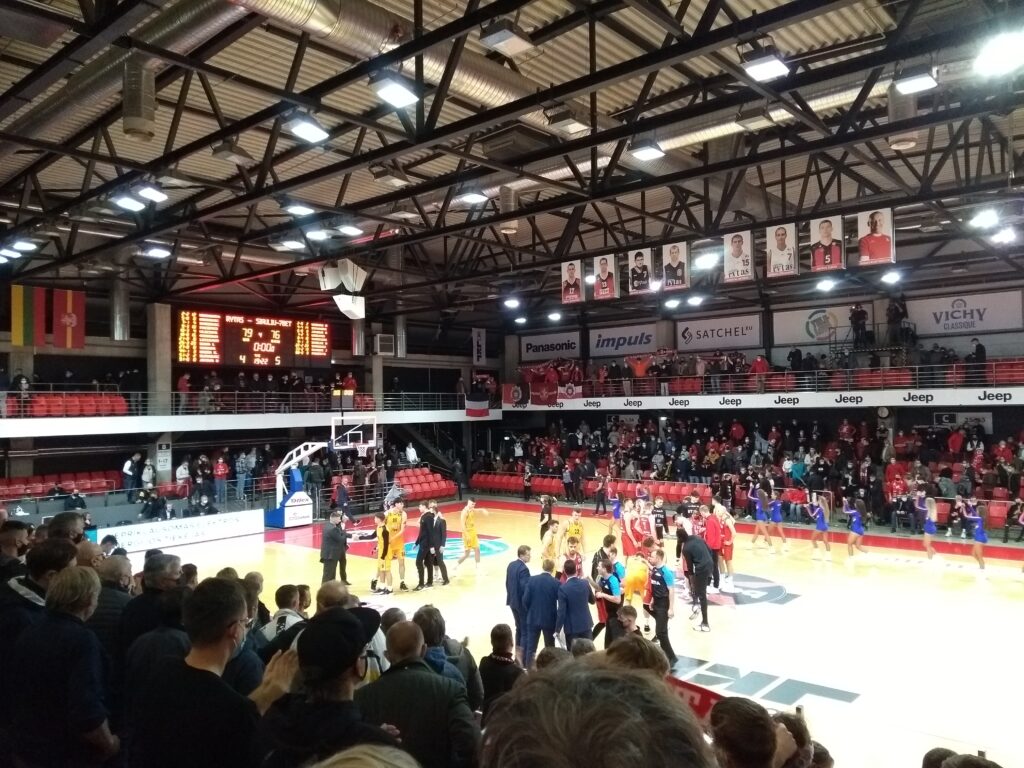
Nach dem Spiel ging ich mit dem Basketballfan im Ozas-Einkaufszentrum nebenan noch etwas essen. Ich bestellte mir endlich einmal die kalte Rote-Beete-Suppe und dazu frittierte Brotstreifen mit einem Käse-Mayonnaise-Dip. Mir wurde gesagt, dazu gehöre typisch litauisch eigentlich noch ein Bier, aber ich mag kein Bier. Zur Suppe gab es frittierte Kartoffeln. In der Suppe schwammen ein Ei, Dill und Gurkenstreifen (oder etwas anderes), sie schmeckte ein wenig nach Gurkensalat, aber in Ordnung – ein gutes Abendbrot, wenn man mittags schon warm gegessen hat. Die Brotstreifen waren mir allerdings zu deep fried. Ich bekam nur die Hälfte davon herunter.
/
After the game, I went to eat with the basketball fan at Ozas shopping centre next door. I finally ordered the cold beetroot soup and fried bread strips with a cheese and mayonnaise dip. I was told that, in typical Lithuanian fashion, it should be accompanied by a beer, but I don’t like beer. The soup was accompanied by deep-fried potatoes. There was an egg, dill and cucumber strips (or something else) floating in the soup, it tasted a bit like cucumber salad, but okay – a good evening meal if you’ve already had a hot lunch. The bread strips were too deep fried for me though. I could only get half of it down.
